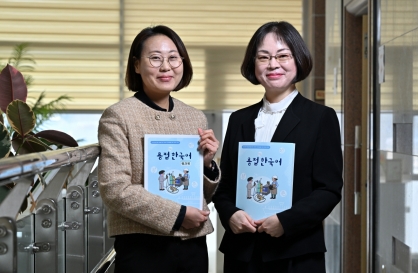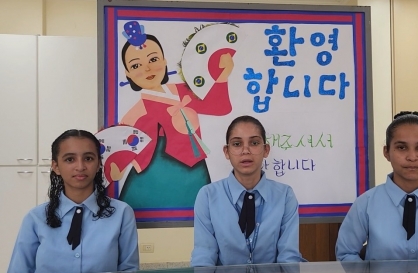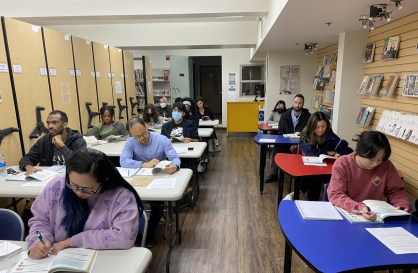Most Popular
Hello Hangeul
-
1
Welding book first in vocational Korean series for foreign labor

-
2
[Korea Beyond Korea] In Sao Paulo, horizons expand for Korean studies
![[Korea Beyond Korea] In Sao Paulo, horizons expand for Korean studies](//res.heraldm.com/phpwas/restmb_idxmake.php?idx=644&simg=/content/image/2023/11/20/20231120000619_0.jpg&u=20231206104853)
-
3
In Brasilia, worldly dreams are born from Korean classes

-
4
Americans seeking to visit Korea learn the language in LA

-
5
[Korea Beyond Korea] Berlin, Europe's Korean Studies hub, nurtures next-gen experts, scholars
![[Korea Beyond Korea] Berlin, Europe's Korean Studies hub, nurtures next-gen experts, scholars](//res.heraldm.com/phpwas/restmb_idxmake.php?idx=644&simg=/content/image/2023/10/18/20231018000929_0.jpg&u=20231023154735)
[Hello Hangeul] What not to do to keep Korean culture, language attractive
China's example shows soft power can't be achieved via government campaign
By Kim So-hyunPublished : Feb. 6, 2023 - 09:38

If countries were people, Korea would be the quiet, hardworking kid who had little chance to show what an interesting person he is, until he started writing great songs and tales that made people cry, laugh and think.
If he continues to excel by getting better at understanding others and making himself understood, he will gain influence, or “soft power.”
A term coined by American political scientist Joseph Nye Jr., soft power is defined as the ability to affect others to get what you want by attraction, not by coercion or payment.
But for now, Korea is relatively new to the world of soft power.
“Korea’s soft power has just started to build up as Korean culture garnered global attention. I think we will get to see the true value of soft power when the young generation who watch Korean dramas now get to play leading roles in society and international spheres,” said Yeon Won-ho, head of the economic security team at the state-funded Korea Institute for International Economic Policy.
Rising clout
Korea is a middle power full of stories from its experiences of war, poverty, dictatorship, rags-to-riches transformations and contemporary woes like social polarization and gender conflicts to which people in both developed and developing countries can relate. And thanks to its talented creators and individuals in entertainment, sports, fashion and many other fields, the country is increasingly becoming an attractive country that people want to visit to learn its language, indulge in its culture and converse with its people.
Wrapping up the 2022 World Cup in Qatar, Fortune magazine picked its soft power champion of the game. Although it was Argentina that took home soccer's top prize, France was named the soft power victor and Korea runner-up.
Attributing Korea’s “inspirational” soft power partly to government policy, but also to the private sector’s “enthusiastic patriotism,” the US magazine made mention of several key factors: how Korea’s first match came after BTS' Jungkook performed in the opening ceremony of the World Cup; how the auto group Hyundai-Kia, which has an endorsement deal with the boy band, is also a key FIFA sponsor; and how Son Heung-min, back from injury, succeeded in “bringing global recognition” to his national team.
“The Koreans’ swashbuckling style of play, matched by exuberant fans, tapped perfectly into a national energy, which has seen it become a juggernaut of 21st-century popular culture,” the magazine said.
Just as young Koreans picked up English by listening to American or British pop music and watching Hollywood movies and TV shows, the proliferation of Korean culture, commonly referred to as the Korean Wave or Hallyu, has led a growing number of people learning the Korean language and script.
When Yeon Jae-hoon, a professor emeritus of Korean language and linguistics at SOAS University of London, first joined the school’s department of East Asian languages and cultures in 1989, he had three students -- a single Korean major and two who chose it as their minor.
But in September 2022, some 120 SOAS freshmen chose Korean for their major, while about 100 and 80 picked Japanese and Chinese, respectively.
“Most of this is thanks to BTS,” Yeon said.
“We owe this popularity of Korean language and Hangeul in Europe, which was unimaginable in the past, to attractive Koreans and the creativity of young Koreans.”
Andrew Jackson, a professor of Korean Studies at Monash University in Australia, says popular culture is now the biggest draw for people to Korean studies, citing data from his university.
“North Korea is well down the list. That wasn’t always the case, but it is now,” he told the World Congress of Korean Studies in October at the Academy of Korea Studies headquarters in Seongnam, Gyeonggi Province.
Most non-native learners of Korean that The Korea Herald spoke to for the “Hello Hangeul” series also said that previous exposure to Korean music, TV dramas and films played a part in their decision to take Korean language classes, other than the Korean alphabet seeming relatively easy to learn as it has fewer components than other Asian language systems.
According to the world’s largest language learning app Duolingo, Korean is the seventh most popular language to study, and one of the fastest growing languages in countries like Brazil, France, Germany, India and Mexico.
Perils of government ambitions
Linguists like Yeon and Kwon Jae-il, chairperson of the 115-year-old Korean Language Society, say the Seoul government and other institutions should refrain from jumping on the bandwagon and going too far as to voice “absurd” slogans like “globalization of Hangeul.”
“Other than the National Institute of Korean Language presenting standards for correct use of the language, and the King Sejong Institute Foundation sending textbooks and teachers to those who ask for our help, the government should do nothing,” Kwon said.
"And in the near future, it should only provide a basic curriculum, and have textbooks developed overseas to suit different cultures and locally train and hire teachers."
A government going beyond the provision of such necessary support and campaigning to disseminate its own language and culture to foreign countries runs the risk of backfiring, experts warned, citing the example of China’s Confucius Institutes.
Many of the Beijing-backed centers, which offered Chinese language and culture courses overseas, were shut down in the West after the US and European countries labeled them propaganda organs.
That is a path that Korea’s own King Sejong Institute Foundation is trying to stay clear of.
“Transplanting Korean culture overseas is not our mission,” said its president, Lee Hae-young, in an interview.
“From an interculturalist point of view, we introduce our culture and language to those who are interested, and express our interest in their cultures so we can exchange,” Lee explained, highlighting interculturalism as her organization’s core perspective.












![[Korea Beyond Korea] In Sao Paulo, horizons expand for Korean studies](http://res.heraldm.com/phpwas/restmb_idxmake.php?idx=644&simg=/content/image/2023/11/20/20231120000619_0.jpg&u=20231206104853)


![[Korea Beyond Korea] Berlin, Europe's Korean Studies hub, nurtures next-gen experts, scholars](http://res.heraldm.com/phpwas/restmb_idxmake.php?idx=644&simg=/content/image/2023/10/18/20231018000929_0.jpg&u=20231023154735)






![[More than APT] Residents, architects together design homes](http://res.heraldm.com/phpwas/restmb_idxmake.php?idx=652&simg=/content/image/2024/11/24/20241124050036_0.jpg&u=)
